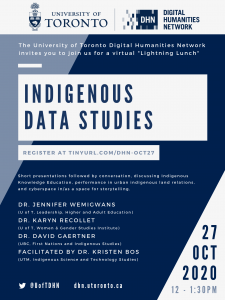
In the second installation of this year’s DHN Lightning Lunches, Jennifer Wemigwans (Leadership, Higher and Adult Education), Karyn Recollet (Women and Gender Studies Institute), and David Gaertner (First Nations and Indigenous Studies at UBC), speak on their work in Indigenous Knowledge Education, performance in urban indigenous land relations, and cyberspace in/as a space for storytelling.
The event will take place from 12 to 1:30pm EST on October 27, 2020. The speakers will give short presentations on their work, followed by a discussion, facilitated by Kristen Bos (Indigenous Science and Technology Studies).
Register here to attend!
Speaker Biographies:
Jennifer Wemigwans is a new media producer/ helper, writer and scholar specializing in the convergence between education, Indigenous knowledge and new media technologies. Her work with diverse Indigenous Knowledge projects across Turtle Island break new ground in conceptualizing media studies and actively contributing to Indigenous resurgence. Dr. Wemigwans is an Assistant Professor in the Adult Education and Community Development program at the Ontario Institute for Studies in Education, University of Toronto.
An urban Cree scholar/artist/and writer, Karyn Recollet’s work focuses on relationality and care as both an analytic and technology for Indigenous movement-based forms of inquiry within urban spaces. Recollet works collaboratively with Indigenous dance-makers and scholars to theorize forms of urban glyphing. Recollet is in conversation with dance choreographers, Black and Indigenous futurist thinkers and Indigenous and Black geographers as ways to theorize and activate futurist, feminist, celestial and decolonial land-ing relationships with more-than-human kinships, and each other.
David Gaertner is an assistant professor in the Institute of Critical Indigenous Studies at the University of British Columbia. His articles have appeared in Canadian Literature, American Indian Cultural and Research Journal, and Bioethical Inquiry, among other publications. He is the editor of Sôhkêyihta: The Poetry of Sky Dancer Louise Bernice Halfe and Read, Listen, Tell: Indigenous Stories from Turtle Island (with Sophie McCall, Deanna Reder, and Gabrielle L’Hirondelle Hill). His latest book, The Theatre of Regret: Literature, Art, and the Politics of Reconciliation is forthcoming from UBC Press (November 15, 2020).
Kristen Bos is an Assistant Professor of Indigenous Science and Technology Studies at the University of Toronto Mississauga and the Co-Director of the Indigenous-led Technoscience Research Unit, an environmental justice lab at the University of Toronto. She is an Indigenous feminist researcher trained in archaeological approaches to material culture as well as an Indigenous science and technology studies (STS) researcher, who is concerned with the relationship between colonial, gendered, and environmental violence. She is urban Métis based in Toronto, but her homeland is northern Alberta where prairie transitions into boreal forest.
Recording Available!
Thank you to everyone for such a wonderful discussion! If you were not able to attend the lunch, or if you would like to rewatch the talk, a Zoom recording is available here. Additionally, we have posted the resources that were shared during the discussion below.
Resources
The CARE Principles for Indigenous Data Governance
Projects:
Mukurtu CMS (see also Traditional Knowledge Labels)
Native Skywatchers: Indigenous Astronomy Revitalization
Further Reading:
Octavia Butler, Kindred, Parable Series, Xenogensis Series, Patternist Series, Fledgling
Kimberly Christen, Does Information Really Want to be Free? Indigenous Knowledge Systems and the Question of Openness
Kimberly Christen and Jane Anderson, Toward Slow Archives
Ashon Crawley, Blackpentacostal Breath: The Aesthetics of Possibility
Lou Cornum, The Space NDN’s Star Map
Marisa Duarte, Network Sovereignty: Understanding the Social and Political Implications of Tribal Command of Internet Infrastructure
Alexis Pauline Gumbs, Dub: Finding Ceremony, M Archive, Spill: Scenes of Black Feminist Fugitivity, Revolutionary Mothering
Laura Harjo, Spiral to the Stars: Mvskoke Tools of Futurity
Tiffany King, The Black Shoals: Offshore Formations of Black and Native Studies, Racial Ecologies: Black Landscapes in Flux, Labor’s Aphasia: Toward Antiblackness as Constitutive to Settler Colonialism
Jessica Kolopenuk, Miskâsowin: Indigenous Science, Technology, and Society
Elizabeth LaPensée, Various Works
Duane Linklater, Monsters of the Urban Unconscious
Katherine McKittrick, Dear Science and Other Stories, Sylvia Wynter: On Being Human as Praxis, Demonic Grounds: Black Women and the Cartographies of Struggle
Skawennati, She Falls for Ages
Kim TallBear, Native American DNA:Tribal Belonging and the False Promise of Genetic Science
Camille Turner, BlackGrange
Vanessa Watts, Indigenous Place-Thought and Agency Amongst Humans and Non Humans (First Woman and Sky Woman Go On a European World Tour!)
Jennifer Wemigwans, A Digital Bundle: Protecting and Promoting Indigenous Knowledge Online
